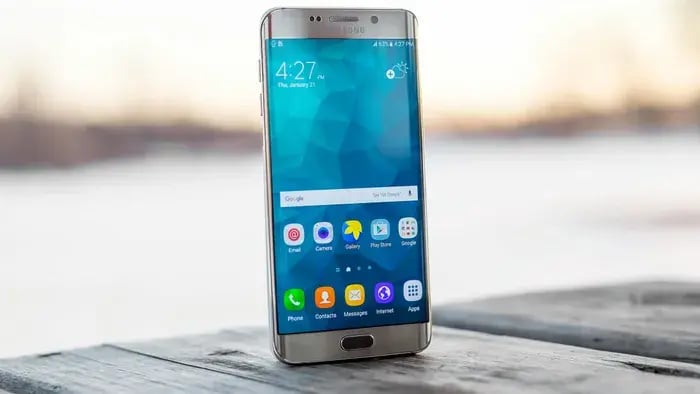- Distraction From Study
- Sleep Disturbance
- Mental Health Problems
- Cyber Bullying
- Lack Of Time Management
- Leads to a Sedentary Lifestyle
- Fewer Real-Life Connections
Introduction

Mobile phones have seamlessly integrated themselves into the modern world. From connecting people around the world to providing a stimulating gaming experience, mobile phones have it all covered. In fact, they have also integrated themselves into the modern education system and social life. Although there are multiple benefits to using a mobile phone, one cannot overlook the potential hazards, especially for children.
Mobile phones can be detrimental to a child's physical, emotional, and academic well-being if not used properly. This is why parents need to regulate their children's mobile phone usage and understand the array of problems associated with it.
Disadvantages Of Mobile Phones For Kids That Parents Must Know

To create a healthy and supportive environment for children, it's essential to manage distractions and monitor their digital footprint. In doing so, restricting the usage of mobile phones becomes inevitable. Here are some of the common disadvantages of mobile phones and why kids need to use them as little as possible.
Distraction From Study
One of the top negative repercussions of mobile phones for kids is distraction from studies. Continuous notifications from social media applications may create a sense of urgency among kids to check their phones. This may lead to a hindrance in studying properly. A lack of concentration may lead to delayed assignments, lower grades, and academic struggles. According to ResearchGate, mobile phones may also impact a child's cognition and make it harder for them to focus. This is why parents can try keeping mobile phones away from kids, especially when they're studying.
Sleep Disturbance
Continuous exposure to blue light emitted from mobile phones can also lead to sleep disturbance. As per the Indian Journal of Medical Research, around 75% of adolescents who use mobile phones at night suffer from sleep disturbances. It can disrupt sleep schedules as kids end up staying up late at night. Moreover, it may also lead to insomnia in the long run and reduce a child's productivity during the day. All these factors, when combined, may lead to lower energy levels and strained academic performance.
Mental Health Problems
According to NLM published in 2018, regular social media consumption may make a child feel pressured and emotionally unstable. A child may constantly compare themselves with other celebrities and influencers on social media. Moreover, they may feel the pressure to follow trends and lead a particular lifestyle. The inability to do the same may put them under severe mental distress and cause isolation as well.
Cyber Bullying
Different types of hackers exploit social media applications to bully users and steal their data. Since children are young and may lack the understanding to deal with such individuals, they may become more vulnerable to such threats. Leakage of personal data can lead to exploitation and blackmail. As per Frontiers, the prevalence range of cyberbullying ranges from 6% to 46.3%. This is why parents need to track their children's digital footprint and inform them about such illegal activities.
Lack Of Time Management
Endless scrolling throughout the day or playing games on mobile phones may make it difficult for a child to manage their time. Not being able to manage time effectively can lead to a severe academic burden and pressure. As per NLM, the child may end up spending most of their leisure time on mobile phones, which can reduce their quality of life. This may impact their emotional health as well.
Leads to a Sedentary Lifestyle
Exercising regularly is essential for kids to stay healthy and happy. Regular physical workout helps a child stay a child and manage their weight effectively. However, constant use of mobile phones throughout the day may make it impossible for a child to step out and play with friends. According to Pediatrics, high screen time and social media usage may prevent a child from indulging in other activities. Sitting the whole day can lead to a lack of weight management and cause health problems as well. Hence, instead of using phones, parents can push their kids to step outside and play regularly.
Fewer Real-Life Connections
For growing kids, it's extremely beneficial to make real-life connections. It may help them enhance their network, interact with other kids, and expand their knowledge. It may also teach a child how to be cooperative in a social environment and learn speaking skills. According to healthcare, perpetual use of social media may deprive kids of developing linguistic and networking skills. Being immersed in the virtual world may make it impossible for a child to make real-life connections. A lack of real-life connections may lead to isolation and hinder learning and development.
Conclusion

While it's true that mobile phones have a lot of benefits, one cannot ignore the downsides of mobile phones. A more practical approach towards using mobile phones is to restrict their usage to educational purposes among kids. This may help them learn the technology while also avoiding unnecessary use.
Pakhi writes with the belief that dessert isn’t just a dish—it’s a mood. Her work blends storytelling with tips, turning timeless treats and trendy bites into accessible moments of comfort, celebration, and creative expression.
The views expressed are that of the expert alone.
The information provided in this content is for informational purposes only and should not be considered a substitute for professional medical advice, diagnosis, or treatment. Always seek the advice of your physician or another qualified healthcare provider before making any significant changes to your diet, exercise, or medication routines.
















